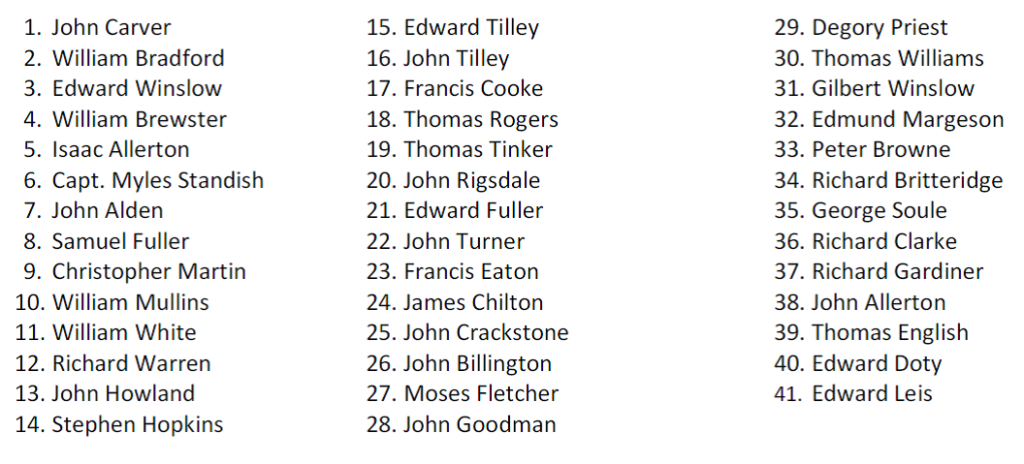We should learn from the hardships and associated lessons-learned by the Pilgrims that provide the foundation of America’s free-market system — so that we don’t repeat their initial missteps. We should recommit ourselves to keeping this land free and prosperous for those who follow us.
Two weeks ago, I began a quartet of messages that tell an important story, when taken together. Click here for the first that referred to that All Hallows Eve (Halloween) 503 years ago that launched the Reformation, and mentioned the Reformation Wall in Geneva on which is found the Mayflower Compact among other founding heralds for Freedom in the Old and New World.
Then click here for last week’s message that honored our veterans and remembered that on 11th hour of the 11th day of the 11th month of 1919 President Woodrow Wilson’s alleged “war to end wars” ended in an Armistice — that lasted less than two decades before we were in World War II.
This week we will reflect on the Mayflower Compact signed 400 years ago on November 11, 1620, and lessons to be learned from its failure as a model for America; and next week we’ll remember how our forefathers (and foremothers) repaired that failure, leading to the first Thanksgiving celebrated by that small band of Puritans in Massachusetts.
In effect, they pioneered an American characteristic memorably attributed to Sir Winston Churchill, “You can count on the Americans to do the right thing after exhausting the alternatives.”
Hopefully, we are running out of alternatives. But I digress. More on that next week, while remembering Thanksgiving.
For now, recall that due to poor navigation, bad weather, rough seas and differences with the Anglican Church of England, the Pilgrims formed and sailed to the New World and landed on the shore of what we now know as Plymouth Rock on Cape Cod in Massachusetts. This was not their intended objective, which was in the northern Virginian territory — by some reports at Jamestown near Norfolk and by others at the mouth of the Hudson River now known as Manhattan.
During that first bitter winter of 1620, they remained on board the Mayflower — during which 45 of the 102 of those who arrived at Plymouth died from lack of shelter, scurvy and the general conditions on that ship that bore them to the new world. Shortly after their arrival, 41 passengers signed the Mayflower Compact intended to govern the new colony:
IN THE NAME OF GOD, AMEN. We, whose names are underwritten, the Loyal Subjects of our dread Sovereign Lord King James, by the Grace of God, of Great Britain, France, and Ireland, King, Defender of the Faith, &c. Having undertaken for the Glory of God, and Advancement of the Christian Faith, and the Honour of our King and Country, a Voyage to plant the first Colony in the northern Parts of Virginia; Do by these Presents, solemnly and mutually, in the Presence of God and one another, covenant and combine ourselves together into a civil Body Politick, for our better Ordering and Preservation, and Furtherance of the Ends aforesaid: And by Virtue hereof do enact, constitute, and frame, such just and equal Laws, Ordinances, Acts, Constitutions, and Officers, from time to time, as shall be thought most meet and convenient for the general Good of the Colony; unto which we promise all due Submission and Obedience. IN WITNESS whereof we have hereunto subscribed our names at Cape-Cod the eleventh of November, in the Reign of our Sovereign Lord King James, of England, France, and Ireland, the eighteenth, and of Scotland the fifty-fourth, Anno Domini; 1620.
The democratic elements from this Covenant of the congregation and its subsequently elected leaders set the colony apart from the monarchies that governed all Western European nations — and undergirded the future government of the American experiment from which we still benefit today.
I am much impressed by the lessons from the history of the governing efforts of these colonists.
At first, they struggled under an attempt to govern according to the aspirations of Plato’s Republic — not only to be religiously devout, but also in a community based on communal sharing and social altruism. All would share in common — no private property or entrepreneurship.
But these conditions of that compact did not serve the original colony well, and they abandoned its terms to adopt a system that allowed them, and their successor Americans to this day, to survive and prosper.
Nevertheless, some today seem to want to return to failed mandates of the Mayflower Compact, now called socialism.
In preparation for Thanksgiving next week, it is worth pondering the lessons of that experience. Hopefully, Churchill’s observation will again prove true — and we will again get it right.
The current liberal socialist-left approach to governance is an echo of that initial approach of the Pilgrims — and we should expect it to fail today, just as it did almost 400 years ago.
Click here for the diary of William Bradford, a signatory of the Mayflower Compact and five-time governor of the Plymouth Colony.
It shows that they cleared land and worked the land, but they had no great harvest and the spirit of brotherhood withered.
Bradford recorded that there was no incentive for individuals to work hard since they were all to share equally in the products of the corporate labor. Initially, the lazy did not work — but eventually even the industrious also lost interest and worked less.
After two years of this failure of socialism/communism, Bradford and the elders of the colony realized that they were on the edge of extinction. So they decided to try something radically different:
They assigned private property rights for divided parcels of land and the right of the individual families to keep the fruits of their own labor. And Plymouth Colony flourished!
Not only did the produce satisfy the needs of each family, but there was plenty to share with others — individuals instituted trading according to their individual talents and the community prospered.
Thus was born American free enterprise, and benefits that far outpaced the attempt to “spread the wealth” and for government to plan and regulate peoples’ lives, per Plato’s Republic.
Our Pilgrim Fathers tried that utopian fantasy and soon realized its bankruptcy and failure as a way for living together in society.
Thankfully, they fostered the innovative idea that when men and women are allowed to follow their own individual and family interests in improving their circumstances, all benefit.
It is helpful to recall the descriptive words of leaders, especially from those who found humor and often wisdom in these difficult times — like Winston Churchill, who has been quoted as saying that “You can count on the Americans to do the right thing after exhausting the alternatives.”
We should bear in mind that important history from our founding when considering the advocacy of today’s so-called “progressives,” who also echo the themes of Karl Marx.
I much prefer the proven approach of the reformed Pilgrims who abandoned the socialism of the Mayflower Compact and instead returned to the recipe that worked from them and their posterity.
It is now called Capitalism, and it has produced the greatest and freest nation on the face of the earth, whatever fault may be found with some of its practitioners. While we can seek to reform those shortcomings, but we should stay the course on the fundamentals.
I continue to stand for the American Flag and the Star Spangled Banner, and reject the ideas of those who would seek Socialism, whatever their motives or however well-intentioned they may be.
I fondly recall “America” that I learned to sing with pride in the First Grade, in the days we could and did pray in school. I didn’t really understand what those words meant in those my early days — but I surely do now.
AMERICA!
My country, ‘ tis of thee,
Sweet land of liberty, of thee I sing;
Land where my fathers died,
Land of the pilgrims’ pride,
From every mountainside let freedom ring!
My native country, thee,
Land of the noble free, thy name I love;
I love thy rocks and rills,
Thy woods and templed hills;
My heart with rapture thrills, like that above.
Let music swell the breeze,
And ring from all the trees sweet freedom’s song;
Let mortal tongues awake;
Let all that breathe partake;
Let rocks their silence break, the sound prolong.
Our fathers’ God, to thee,
Author of liberty, to thee we sing;
Long may our land be bright
With freedom’s holy light;
Protect us by thy might, great God, our King.
Click here for a you Tube video of the The Soldiers’ Chorus of The United States Army Field Band singing this glorious song, ironically to the tune of Great Britain’s National Hymn. Our adversaries in the Revolutionary War are now among our strongest allies.
Bottom Lines.
As we prepare with family and friends to give thanks for all we have inherited this coming Thanksgiving, pray that we can find a way to assure for all who follow us the American dream that has previously stirred so many — and kept us free.
Please include a prayer that God helps us to preserve this the greatest nation in History for our posterity.
What can you do?
Join us in praying for our nation, and for a rebirth of the freedom sought, achieved and passed to us by those who came before us.
Help us to spread our message to the grass roots and to encourage all “powers that be” to provide for the common defense as they are sworn to do.
Begin by passing this message to your friends and suggest they visit our webpage www.highfrontier.org, for more information. Also, please encourage your sphere of influence to sign up for our weekly e-newsletter.
Encourage them to review our past email messages, posted on www.highfrontier.org, to learn about many details related to the existential man-made and natural EMP threats and how we can protect America against them. I hope you will help us with our urgently needed efforts, which I will be discussing in future messages.
Click here to make a tax deductible gift. If you prefer to mail a check, Please send it High Frontier, 20 F Street 7th Floor, Washington, DC 20001.
E-Mail Message 201117
Please click here to read Past Weekly Updates!
Please help High Frontier continue this important and timely work!
Be sure to follow us on our Social Sites!
If you found this letter via our Social Sites, and you would like to subscribe, please click below!






